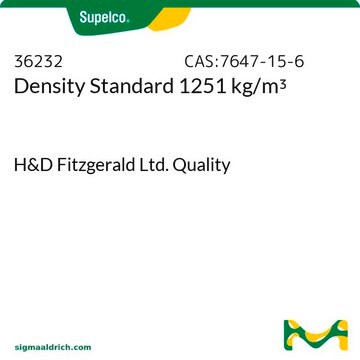15889
Density Standard 1623 kg/m3
H&D Fitzgerald Ltd. Quality
Synonym(s):
Tetrachloroethylene, PCE, Perchloroethylene
About This Item
Recommended Products
grade
H&D Fitzgerald Ltd. Quality
analytical standard
vapor density
5.83 (vs air)
vapor pressure
13 mmHg ( 20 °C)
19 mmHg ( 25 °C)
shelf life
limited shelf life, expiry date on the label
manufacturer/tradename
H&D Fitzgerald Ltd.
refractive index
n20/D 1.505 (lit.)
bp
121 °C (lit.)
mp
−22 °C (lit.)
density
1.623 g/mL at 25 °C (lit.)
application(s)
cleaning products
cosmetics
environmental
flavors and fragrances
food and beverages
industrial qc
personal care
petroleum
pharmaceutical (small molecule)
format
mixture
SMILES string
Cl\C(Cl)=C(\Cl)Cl
InChI
1S/C2Cl4/c3-1(4)2(5)6
InChI key
CYTYCFOTNPOANT-UHFFFAOYSA-N
Looking for similar products? Visit Product Comparison Guide
Application
Features and Benefits
- Manufactured and verified in an ISO 17025 accredited laboratory, as per UKAS
- Carries an associated uncertainty of +/- 0.010 Kg/m3
- Provided in a sealed glass ampoule of 10 mL to assure safe delivery
- Accompanied with a certificate of analysis (CoA) having information on the expiry date for an effective audit
Signal Word
Warning
Hazard Statements
Precautionary Statements
Hazard Classifications
Aquatic Chronic 2 - Carc. 2 - Eye Irrit. 2 - Skin Irrit. 2 - Skin Sens. 1 - STOT SE 3
Target Organs
Respiratory system
Storage Class Code
6.1C - Combustible acute toxic Cat.3 / toxic compounds or compounds which causing chronic effects
WGK
WGK 3
Flash Point(F)
No data available
Flash Point(C)
No data available
Choose from one of the most recent versions:
Already Own This Product?
Find documentation for the products that you have recently purchased in the Document Library.
Customers Also Viewed
Our team of scientists has experience in all areas of research including Life Science, Material Science, Chemical Synthesis, Chromatography, Analytical and many others.
Contact Technical Service

![Bicyclo[2.2.1]hept-5-ene-2,3-dicarboxylic anhydride ≥95.0%](/deepweb/assets/sigmaaldrich/product/structures/463/743/23d4e603-9c88-402a-96a9-68cd71d62279/640/23d4e603-9c88-402a-96a9-68cd71d62279.png)






